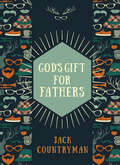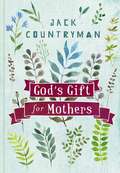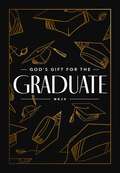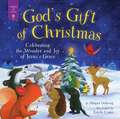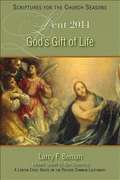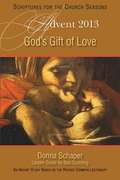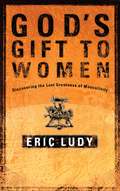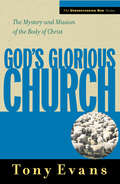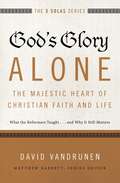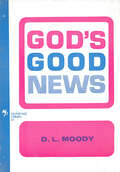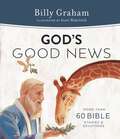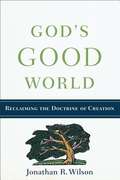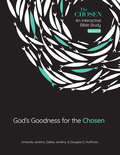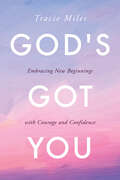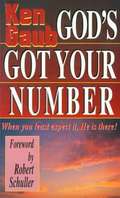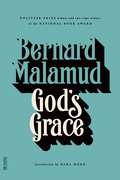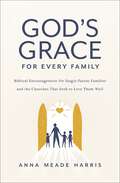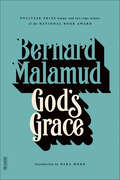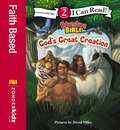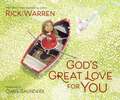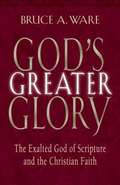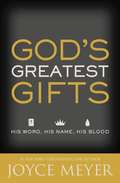- Table View
- List View
God's Gift for Fathers
by Jack CountrymanThank your father for his powerful influence in your life through the timeless truths found in Scripture and in God’s Gift for Fathers. Men will be empowered and encouraged through the spiritual wisdom found in the promises God makes specifically to fathers in His Word. The Bible is rich with descriptions and stories of godly fathers, and in God’s Gift for Fathers bestselling author Jack Countryman walks you through more than 60 different ways that God leads and instructs fathers. Read through God’s intention for fatherhood and learn from those who were good fathers in the Bible—and those who failed. You will find a crises Scripture guide with counsel for the hardships that you and your family may come across, and be encouraged as you see how God listens to prayer, keeps you secure, and comforts you in your times of need as a father. Mediate on the Scripture passages, and inspire your heart as you delve into the promises God has made just for you. With a modern design, timeless content, and the words of the New King James Version, God’s Gift for Fathers is a classic in the making. This book will bring peace and wisdom to your heart and would also make a perfect gift for birthdays, holidays, Father’s Day, and as a “just because!” gift to share with the special fathers in your life. God strengthens fathers. He promises to walk alongside His sons as they raise future generations to know His name. Lean in closer to hear His promises and the rich blessings that He offers in God’s Gift for Fathers.
God's Gift for Mothers
by Jack CountrymanGod’s Word is the greatest gift any mother could receive. God’s Gift for Mothers is filled with God’s wisdom, promises, and instructions to guide and encourage mothers in their everyday lives. The Bible is rich with descriptions and stories of godly mothers, and in God’s Gift for Mothers bestselling author Jack Countryman walks you through 89 different ways that God blesses and cares for mothers. Dig deeper into the most influential mothers in the Bible, from Hannah to Ruth to Mary, and pray the same prayers these women whispered in their moments of need. Mediate on the Scripture verses, and inspire your heart as you delve into the promises God has made just for you. With a beautiful, modern design, timeless content, and the words of the New King James Version, God’s Gift for Mothers is a classic in the making. This book will bring joy and peace to your heart and would also make a perfect gift for birthdays, holidays, Mother’s Day, and as a “just because!” gift to share with the special mothers in your life. God delights in mothers. He promises to walk alongside His daughters as they raise future generations to know His name. Lean in closer to hear His promises and the rich blessings that He offers in God’s Gift for Mothers.
God's Gift for the Graduate NKJV: Biblical Wisdom and Bible Verses (A 52-Day Devotional)
by Jack CountrymanLove. Protection. Direction. God loves to give abundant gifts! During the time surrounding graduation, a season of new beginnings, seek God's face and receive His gifts through the powerful devotions and Bible verses in this inspiring book from Jack Countryman.God's Gift for the Graduate includes 60 inspirational devotions, along with Scripture and prayers, to remind you that God is eager to bless and guide you in this new season of life.This book will keep you rooted in these comforting truths from God's Word:God has an incredible, eternal purpose for youGod's wisdom can guide you as you make decisions about the futureRelying on God every day brings confidence and peaceYou can live your best, world-changing life in the center of God's willGod offers gifts of joy, friendship, hope, and so much more This striking book is a perfect gift for:College, trade school, nursing, seminary, and high school graduatesAdults who returned to school for a secondary degreeTeens, grandchildren, nieces, nephews, and friends Starting a new chapter in life can feel both intimidating and exciting—but you don't have to do it alone. God is with you through every opportunity and challenge, ready each step of the way to give you His good and perfect gifts.
God's Gift of Christmas: Celebrating the Wonder and Joy of Jesus's Grace (Forest of Faith Books)
by Abigail GehringJoin Little Squirrel as he discovers the true gift of Christmas! Little Squirrel is excited for the Christmas season, but he begins to wonder if he's been a good enough squirrel to deserve the presents and treats he hopes for on Christmas morning. He decides to do one kind or helpful thing every day leading up to Christmas. Things are going well and Little Squirrel is finding lots of ways to help his fellow woodland creatures. But when he makes a big mistake on the day before Christmas, he feels like a total failure. In the midst of his misery, Mama Squirrel has good news. She reminds him that Christmas is not about being "good enough." Jesus's love is a free gift and we can never earn it, no matter how hard we try! Slowly, Little Squirrel begins to grasp the true joy and wonder of God's abundant grace. God's Gift of Christmas is the latest addition to the heartwarming Forest of Faith storybook series, including A Birthday Party for Jesus, Everyone Is Invited to Christmas, Christmas Tree for Jesus, Christmas Journey for Jesus, An Easter Basket Filled with Love, and God&’s Love Is a Warm Cookie.
God's Gift of Life
by Nan Duerling Larry F. BemanThe study for Lent in the Scriptures for the Church Seasons series is based upon the Revised Common Lectionary scriptures for the church year, a three-year cycle that includes readings from the Old Testament, the Gospels, and the Epistles. The study will help Christians understand, appreciate, and participate in meaningful reflection during Lent and in joyous celebration on Easter. The Leader Guide, written by Nan Duerling, is combined with the Student Book allowing more flexibility for leading the study.
God's Gift of Love
by Donna Schaper Nan DuerlingAdvent is a busy and sometimes stressful time of year, but in God's Gift of Love, Donna Schaper reminds us that Advent also gives us an opportunity to slow down, recognize that God's love has found us, and live in peace. By changing our attitude and our understanding of time, we can prepare for and look forward to the coming of Jesus Christ. We can be ready to conceive God's love in us and reconceive our lives and our behavior toward others. Schaper's writing helps us understand that love is not a sentiment but a way of life that emerges from the knowledge that in Jesus Christ, we experience God's love. God's Gift of Love offers the opportunity and challenge to appreciate and live in the amazing gift of God's love by studying the Revised Common Lectionary readings designated for Advent, Year A. Donna Schaper helps readers experience the blessings of Jesus' birth and Christ's second coming in the fullness of time. A Leader Guide by Nan Duerling, with Bible background and suggestions for group activities, is included in this book.
God's Gift to Women: Discovering the Lost Greatness of Masculinity
by Eric LudyIn a culture that exalts the caveman-like qualities of masculinity, most women have stopped expecting anything more. Young men are taught to view women as slaves to their self-centered desires. More than ever, men need to know that they can rise above this sad mediocrity. They desperately need someone to recognize their potential for blending courage and kindness, strength and spiritual sensitivity. With its riveting vision of Christ-centered manhood, God's Gift to Women shows young men how to become the heroic, selfless knight that every woman dreams about.Buried Inside Every Young Man Is the Potential to Change the World Deep within the rugged soul of every young man, there is a warrior in search of his sword and a poet in search of his pen. But heroic, prince-like masculinity is something most women only dream of in today's perverse and self-serving world. With contagious passion and boldness, Eric Ludy challenges you to forsake modern male mediocrity for Christ-built, warrior-poet manhood--manhood that will capture the heart of a woman and change the course of history.From the Trade Paperback edition.
God's Glorious Church: The Mystery and Mission of the Body of Christ
by Tony EvansTony Evans defines the church in vibrant terms: it is a continuation of Christ's incarnation. As such, it is the most important spiritual institution in human history. He helps the church discover its identity and purpose for existence, and provides believers a biblically healthy context in which to grow and live out their lives. This book will inspire you to help make your place of worship all that God intends it to be.
God's Glorious Church: The Mystery and Mission of the Body of Christ
by Tony EvansTony Evans defines the church in vibrant terms: it is a continuation of Christ's incarnation. As such, it is the most important spiritual institution in human history. He helps the church discover its identity and purpose for existence, and provides believers a biblically healthy context in which to grow and live out their lives. This book will inspire you to help make your place of worship all that God intends it to be.
God's Glory Alone---The Majestic Heart of Christian Faith and Life: What the Reformers Taught...and Why It Still Matters
by Matthew Barrett David VandrunenHistorians and theologians have long recognized that at the heart of the sixteenth-century Protestant Reformation were five declarations, often referred to as the ‘solas’: sola scriptura, solus Christus, sola gratia, sola fide, and soli Deo gloria. These five statements summarize much of what the Reformation was about, and they distinguish Protestantism from other expressions of the Christian faith. Protestants place ultimate and final authority in the Scriptures, acknowledge the work of Christ alone as sufficient for redemption, recognize that salvation is by grace alone through faith alone, and seek to do all things for God’s glory. In God’s Glory Alone—The Majestic Heart of Christian Faith and Life, renowned scholar David VanDrunen looks at the historical and biblical roots of the idea that all glory belongs to God alone. He examines the development of this theme in the Reformation, in subsequent Reformed theology and confessions, and in contemporary theologians who continue to be inspired by the conviction that all glory belongs to God. Then he turns to the biblical story of God's glory, beginning with the pillar of cloud and fire revealed to Israel, continuing through the incarnation, death, and exaltation of the Lord Jesus Christ, and culminating in Christ's Second Coming and the glorification of his people. In light of these wonderful biblical themes he concludes by addressing several of today's great cultural challenges and temptations—such as distraction and narcissism—and reflecting on how commitment to God's glory alone fortifies us to live godly lives in this present evil age.
God's Good News (Colportage Library #21)
by Dwight L. MoodyGod's Good News features eight powerful addresses given by one of the greatest evangelists of the 19th century, D. L. Moody. He presents the gospel from Genesis, Matthew, Luke, Romans, and Corinthians and spends two chapters on the emptiness of excuses. His stimulating writing and challenging messages will help the seeker discover Christ.
God's Good News (Colportage Library #21)
by Dwight L. MoodyGod's Good News features eight powerful addresses given by one of the greatest evangelists of the 19th century, D. L. Moody. He presents the gospel from Genesis, Matthew, Luke, Romans, and Corinthians and spends two chapters on the emptiness of excuses. His stimulating writing and challenging messages will help the seeker discover Christ.
God's Good News: More Than 60 Bible Stories and Devotions
by Billy GrahamGod's Good News is even more child-friendly with a new cover, smaller trim size, and even a lower price point. More than 60 favorite Bible stories are told in actual Bible text from the New King James Version, each paired with a takeaway devotion from Rev. Graham. The takeaways will help children focus on God&’s Word, apply it to their lives, and begin sharing the good news from an early age. "Christianity is good news. . . . When we open up the Bible, it is good news from cover to cover. It's the good news that God loves us." —Billy GrahamNo one has brought the good news to more people than Reverend Billy Graham, and the people who admire him span all generations. This lovely edition of God's Good News will be a timeless classic for parents and grandparents to give a new generation of children the good news, to show them the way to the cross, and to help them begin a lifetime of following Christ.Invite the children you love to experience God through powerful stories from the Bible. They will imagine the walls of water in the parted Red Sea, figure out why Joseph chose to forgive his brothers, read about a paralyzed man Jesus healed, and discover God&’s exciting plan for their lives. Most of all, this Bible storybook helps children understand God's incredible love for them. Each story is equipped with a takeaway devotion from Rev. Graham. The takeaways will help children focus on God's Word, apply it to their lives, and begin walking with God and sharing the good news from an early age.With Bible stories told in actual Bible text, this storybook teaches that God loves us, saves us from our sin, and invites us into a new life with Him. Each entry includes the wisdom of Billy Graham, who spent his life helping people all over the world understand and respond in faith to the love and mercy of Jesus Christ. The Bible tells us that God loves us, and that is good news!The striking artwork from Scott Wakefield will help children connect with the timeless Bible stories and messages from Rev. Graham.
God's Good World: Reclaiming the Doctrine of Creation
by Jonathan WilsonThe doctrine of creation has often been neglected in Christian theology. Distinguished evangelical theologian Jonathan Wilson exposes what has been missing in current theological discourse and offers an original, constructive work on this doctrine. <p><p> The book unites creation and redemption, showing the significance of God's work of creation for understanding the good news of redemption in Jesus Christ. Wilson develops a trinitarian account of the life of the world and sets forth how to live wisely, hopefully, peaceably, joyfully, and generously in that world. He also shows how a mature doctrine of creation can help the church think practically about contemporary issues, including creation care, sexuality, technology, food and water, and more.
God's Goodness for the Chosen: An Interactive Bible Study Season 4 (The Chosen Bible Study Series #4)
by Amanda Jenkins Dallas Jenkins Dr. Douglas S. HuffmanGod&’s Goodness for the Chosen is an eight-lesson Bible study for individuals or groups that follows each episode of season 4 of The Chosen. This study teaches readers how to reframe their hardships and see them as fertile soil for God&’s goodness to grow in their lives. We see it over and over again in the Bible: God brings good things out of bad things for the sake of His people and for His glory. But truth be told, when we personally experience suffering, we have a difficult time actually believing it. Yet, life is challenging even for the followers of Jesus, and hardship in the twenty-first century is no exception. God&’s Goodness for the Chosen takes readers through eight lessons which reveal how God uses suffering to bring about good things in the lives of those He loves. You&’ll see: • Death is eclipsed by life • Grief is eclipsed by praise • Questions are eclipsed by resolve • Confusion is eclipsed by grace • Temporary things are eclipsed by eternal things • Heartbreak is eclipsed by love • Sin is eclipsed by obedience • Pain is eclipsed by the fullness of God&’s plan Indeed, readers will be challenged to embrace the hard things of life, to experience more of the goodness God offers on the other side.
God's Got You: Embracing New Beginnings with Courage and Confidence
by Tracie MilesDuring times of transition—such as a move, a divorce, or just a new season of life—you need reminders that even when you feel out of control, God is in control. In this practical guide to navigating uncharted territory, Tracie Miles equips you to say goodbye to the way things once were so you can embrace God&’s future for us. Beginning again can feel scary, even in the best of times. This biblically based guide equips you for the future God has for you, even if it&’s not the one you expected. God&’s Got You offers the encouragement you need to: Identify the stumbling blocks that prevent you from moving forward. Use times of transition to become who you&’ve always wanted to be. Feel empowered to pursue the desires and dreams in your heart. Map out a life plan for the season ahead. At a time when you might be feeling fearful, Tracie helps you find the courage to reinvent yourself. With prompts for goal setting, vision casting, action steps, reflection, and prayer, God&’s Got You empowers you to step boldly into the next season of your life.
God's Got Your Number
by Ken GaubDo you wonder if miracles from God truly occur in today's world? Are you afraid walking in Christian faith requires too much sacrifice? Then perhaps you've never received a phone call from heaven. Ken Gaub did, and for this world evangelist it was a wake-up call that the God who talked with Adam in the cool of the Garden has never abandoned mankind, and stays in close contact with us still today. Gaub's unique blend of humor and straightforward teaching make this book a delightful read for anyone wishing to renew the strength of faith. This humble servant relates how his young faith in God prevented him from "chickening-out" when preaching to his first "congregation," and continues with the state of things today as he travels worldwide on missions for Christ.
God's Grace
by Bernard MalamudMalamud's last novel, is a modern-day dystopian fantasy, set in a time after a thermonuclear war prompts a second flood--a radical departure from Malamud's previous fiction.
God's Grace for Every Family: Biblical Encouragement for Single-Parent Families and the Churches that Seek to Love them Well
by Anna Meade HarrisWinner of the 2024 Christianity Today Book Award for Marriage, Family, and SinglenessWeaving her own story together with nine attributes of God's character revealed from Scripture, Anna Meade Harris speaks to vulnerable single parents and to churches who want to love them well.After the death of her husband, Anna Meade Harris discovered that single-parent families don't seem to have a place in the local church. Because she and her kids no longer fit into the Christian family mold, the body of Christ felt alien and strange when Anna's family needed it the most. Belonging, even in the most loving church, was a challenge.God's Grace for Every Family was born out of Anna's desire to help other families avoid feeling the loneliness that hers felt. This gospel-centered work addresses the single parent who needs to know that God sees, loves, and cares for their family. The book also addresses the church at large, in the hopes that Christians will come to understand the unique needs of single-parent families and do a better job of welcoming, valuing, and loving them.The book begins with Anna's story and then presents information about single-parent families in America, providing an understanding of their unique needs and complex dynamics. The chapters that follow each focus on a particular area of need and contain:Exegesis of Scripture demonstrating the character of God in relationship with his peopleShort narratives collected through interviews with single parents from a variety of backgroundsSuggestions for how the church can serve God and familiesThis book is written for all Christians, married or single, parent or childless. It's written for widows, divorcees, and those who never married. And it's written for the congregants, pastors, leaders, and church family who wants to embrace every family and learn how to serve them well. By addressing families and the church together, God's Grace for Every Family opens the door for gracious conversations and greater unity in the family of God.
God's Grace: A Novel (Fsg Classics Ser.)
by Bernard MalamudGod's Grace (1982), Bernard Malamud's last novel, is a modern-day dystopian fantasy, set in a time after a thermonuclear war prompts a second flood -- a radical departure from Malamud's previous fiction. The novel's protagonist is paleolosist Calvin Cohn, who had been attending to his work at the bottom of the ocean when the Devastation struck, and who alone survived. This rabbi's son -- a "marginal error" -- finds himself shipwrecked with an experimental chimpanzee capable of speech, to whom he gives the name Buz. Soon other creatures appear on their island-baboons, chimps, five apes, and a lone gorilla. Cohn works hard to make it possible for God to love His creation again, and his hopes increase as he encounters the unknown and the unforeseen in this strange new world. With God's Grace, Malamud took a great risk, and it paid off. The novel's fresh and pervasive humor, narrative ingenuity, and tragic sense of the human condition make it one of Malamud's most extraordinary books. "Is he an American Master? Of course. He not only wrote in the American language, he augmented it with fresh plasticity, he shaped our English into startling new configurations." --Cynthia Ozick
God's Great Creation: Level 2 (I Can Read! / Adventure Bible)
by ZondervanGod spent seven days creating the world. On the sixth day, he made Adam and Eve—people just like us! God loved everything he made. But one day, Adam and Eve disobeyed God.This is a Level Two I Can Read! book, which means it&’s perfect for children learning to sound out words and sentences. It aligns with guided reading level J and will be of interest to children Pre-K to 3rd grade.
God's Great Love for You
by Rick WarrenGod&’s Great LoveCreated the entire universeAnd everything in itIncluding you.God&’s Great Love for You, written by #1 New York Times bestselling author and respected pastor Rick Warren, takes children on a whimsical and heartfelt journey that lets them know God&’s love is with them wherever they go. With breathtaking illustrations by Chris Saunders, the simple yet poignant text comes alive as a child journeys to places far and near and discovers God&’s great love is perfect, and everywhere, and will never end.
God's Greater Glory: The Exalted God of Scripture and the Christian Faith
by Bruce A. WareThough in all things God's Word is the final authority, our Christian tradition, as inherited from centuries of careful reflection and endeavoring to be true to the teaching of Scripture, can greatly enlighten us. Nowhere is this blend of respectful listening to the wisdom of the past and faithfulness to the Bible more necessary than in our contemporary reformulations of the doctrine of God's person. Bruce Ware believes that while tradition's emphasis on God's metaphysical perfection and His supremacy over the world is correct, we must refine our understanding of the way in which He relates to us. While retaining the deepest concerns of the historic tradition, Ware offers a more rational view of God's dealings with His children--a view that is reflected in Scripture's own testimony of Him. Ware then applies this concept of real divine exaltation and real divine-human relationship to the areas of our prayer life, confidence in God and His guidance of us.
God's Greatest Gifts: His Word, His Name, His Blood
by Joyce MeyerGod has given you the weapons you need to keep Satan in his rightful place of defeat. Now more than ever, Satan is launching his most violent attacks against the children of God. But you are not defenseless against these attacks. God has provided you with powerful weapons to overcome every obstacle life presents. Joyce Meyer uncovers the keys of building a strong foundation in the Word of God. Through exploring Scriptural principles, she highlights how to assume God's authority to help you rise above challenges and understand the power you have through the blood of Jesus. God does not intend for you to spend all your time fighting the enemy. He wants you to enjoy a life of freedom and complete liberty. By using the principles outlined in this book, you will learn how to effectively use the weapons God has given you to live a victorious life!You will learn:How to be changed by the power of the WordHow to wield the weapon of the WordHow to exercise authority in the name of JesusThe power of the blood covenantWhy Satan is afraid of the blood of Jesus.Be an overcomer through claiming the power of GOD'S GREATEST GIFTS!
